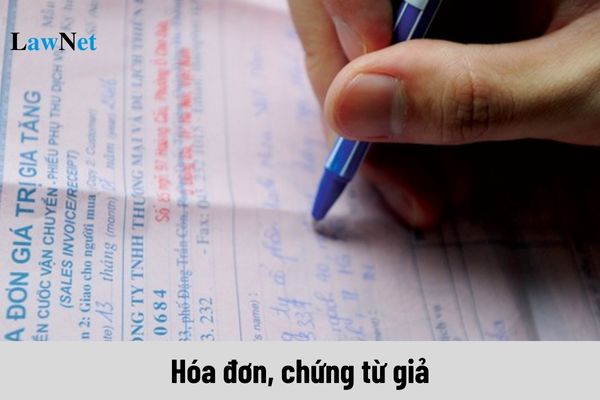What are fake invoices and records in Vietnam?
What are fake invoices and records in Vietnam?
According to Clause 8, Article 3 of Decree 123/2020/ND-CP, the explanation is as follows:
Fake invoices and records are those that are printed or issued following the templates of invoices and records that have been publicly released by another organization or individual, or printed and issued with duplicate serial numbers under the same invoice or record symbol, or forged electronic invoices or electronic records.

What are fake invoices and records in Vietnam? (Image from the Internet)
What are the current principles for issuing, managing, and using invoices and records in Vietnam?
Specifically, Article 4 of Decree 123/2020/ND-CP regulates the principles for issuing, managing, and using invoices and records as follows:
(1) When selling goods or providing services, the seller must issue an invoice to the buyer (including cases where goods or services are used for promotion, advertising, samples; goods or services are given, presented, exchanged, used to pay salary for employees, and internal consumption (except for internally rotated goods for further production); exporting goods in forms of loan, borrowing, or returning goods) and must fully record the content as prescribed in Article 10 of Decree 123/2020/ND-CP. In case of using electronic invoices, it must comply with the standard data format of the tax authority as prescribed in Article 12 of Decree 123/2020/ND-CP.
(2) When deducting personal income tax, collecting taxes, fees, charges, organizations deducting tax, organizations collecting fees, charges, tax must issue tax deduction certificates, tax receipts, charges, deliver to the individuals whose income is subjected to tax deduction, taxpayers, fee payers and must fully record the content as stipulated in Article 32 of Decree 123/2020/ND-CP. If using electronic receipts, it must comply with the standard data format of the tax authority. In cases where individuals authorize tax finalization, no certificates for personal income tax deduction are issued.
For individuals not signing a labor contract or signing a labor contract for less than 3 months, the organization, individual paying income may choose to issue a tax deduction certificate for each deduction or issue one certificate for multiple deductions in one tax period. For individuals signing a labor contract of 3 months or more, the organization, individual paying income issues only one tax deduction certificate in one tax period.
(3) Before using invoices, receipts, enterprises, economic organizations, other organizations, households, business individuals, organizations collecting taxes, fees, fines must register usage with the tax authority or perform a release notification following Article 15, Article 34, and Clause 1, Article 36 of Decree 123/2020/ND-CP.
For invoices, receipts printed by the tax authority, the tax authority will issue release notifications as per Clause 3, Article 24, and Clause 2, Article 36 of Decree 123/2020/ND-CP.
(4) Organizations, households, business individuals during the course of usage must report on the usage situation of invoices purchased from the tax authority, self-printed receipts, or those purchased from the tax authority as stipulated in Article 29, Article 38 of Decree 123/2020/ND-CP.
(5) The registration, management, usage of electronic invoices and electronic records must comply with the legal regulations on electronic transactions, accounting, tax, tax management, and the regulations in Decree 123/2020/ND-CP.
(6) Data on invoices, records when selling goods, providing services, and data on records for tax transactions, tax deductions, and payment of taxes, fees, are the data basis for tax management and providing information on invoices, records to relevant organizations and individuals.
(7) Businesses, economic organizations, or other organizations selling goods or services have the right to authorize a third party to issue electronic invoices for selling goods or providing services. Invoices issued by a third party on behalf of the original seller must still display the name of the original selling entity as the authorizing entity. The authorization must be recorded in writing between the authorizing party and the authorized party, clearly displaying all information about the authorized invoice (purpose of authorization; period of authorization; payment method for authorized invoice) and must notify the tax authority when registering to use electronic invoices. In cases where the authorized invoice is an electronic invoice without a tax authority's code, the authorizing party must transfer the electronic invoice data to the tax authority via the service provider. The Ministry of Finance provides specific guidance on this.
(8) Organizations collecting fees are authorized to a third party to issue fee receipts. Receipts issued by a third party on behalf of the original collector must still display the name of the original collecting organization as the authorizing entity. The authorization must be recorded in writing between the authorizing party and the authorized party, clearly displaying all information about the authorized receipt (purpose of authorization; period of authorization; method of payment for authorized receipt) and must notify the tax authority when issuing receipt notifications.
What acts are prohibited in the field of invoices and records in Vietnam?
According to Article 5 of Decree 123/2020/ND-CP, the following prohibitions are outlined in the domain of invoices and records:
- For Tax Officials
+ Causing trouble, difficulties for organizations, individuals coming to purchase invoices, records;
+ Engaging in acts of covering up, colluding with organizations, individuals to use unlawful invoices, records;
+ Accepting bribes during inspections, audits regarding invoices.
- For organizations, individuals selling, supplying goods, services, organizations, individuals with related rights and obligations
- Engaging in fraudulent actions such as using illegal invoices, unlawful use of invoices;
- Obstructing tax officials in the execution of duties, specifically actions obstructing causing harm to the health, dignity of tax officials during inspections, audits regarding invoices, records;
- Unauthorized access, altering, destroying information systems about invoices, records;
- Offering bribes or performing other actions related to invoices, records for unlawful gain.

